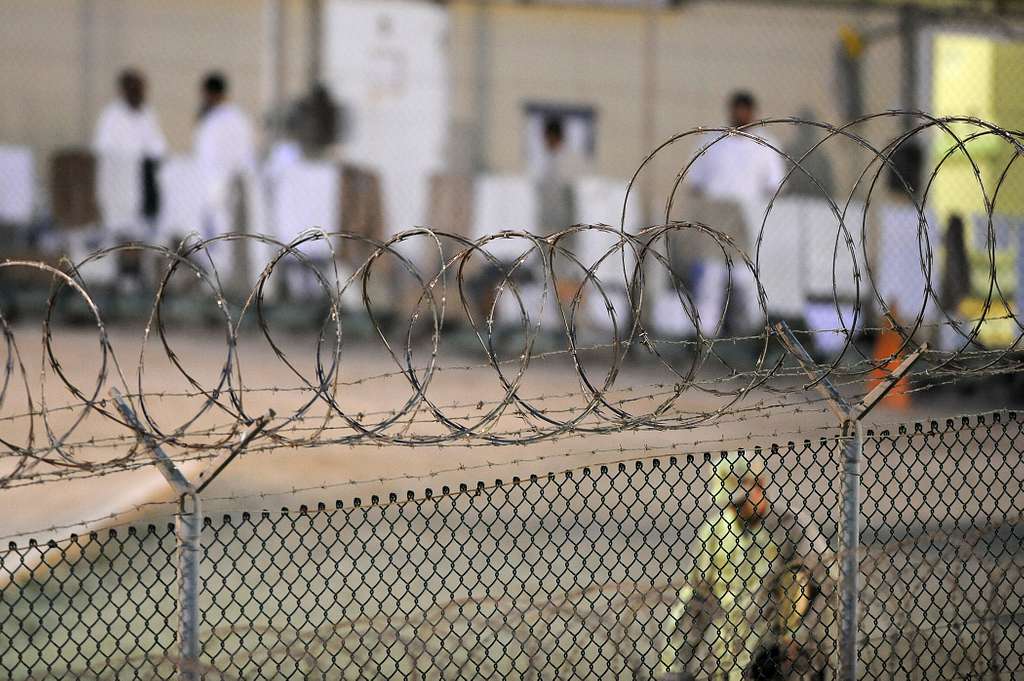The United States Faces a Test on Guantánamo Bay in Geneva
The United States has excluded most law from Guantánamo Bay for decades. It should reverse that position now and provide medical care for its declining detainees.

Published by The Lawfare Institute
in Cooperation With

In January 2002, the first men were forcibly transferred to Guantánamo Bay from Afghanistan, shackled, diapered, blindfolded, and thrown into “dog cages.” One of the first commands issued by President George W. Bush was that the Geneva Conventions—which dictate the rights of those detained and the obligations of the detaining power—would not apply to the new detention camp. This directive came as a shock to the officers on the ground—including then-commandant of the prison Mike Lehnert, who had been trained on international humanitarian law.
In fact, the U.S. government chose to imprison “war on terror” detainees at Guantánamo Bay specifically because the base was the only place fully under U.S. control where the government could argue that neither domestic nor international legal protections for detainees applied.
Over nearly 22 years, the United States has been pressured to change this position by legal challenges and international outcry, particularly following the torture of detainees at Guantánamo. Progress has been slow and almost imperceptible. And still, the government continues to argue that detainees are subject to a unique legal regime excluding most of the rights guaranteed by domestic or international law.
This week in Geneva, the United States will again be forced to explain that position. And as a longtime attorney for detainees, who has fought violations at Guantánamo for a decade, I will be present to challenge the U.S.’s use of Guantánamo as a “legal black hole.”
The occasion is the latest convening of the Human Rights Committee on the International Covenant on Civil and Political Rights (ICCPR). A U.S. delegation will face independent UN experts on the committee, tasked with assessing compliance with the ICCPR, who will once again question U.S. treaty violations at Guantánamo Bay. The U.S. presentation provides an opportunity for President Biden to take a significant step forward and recognize the application of international law to the medical needs of an aging detainee population that is fast deteriorating from the effects of torture and harsh conditions.
The Government’s Evolving Legal Arguments
Over nearly 22 years of detention at Guantánamo, the United States has consistently argued that the men it detains are exempt from nearly every law embodying democratic values—and has sought to circumvent every court opinion finding otherwise.
The government first defended this position with regard to U.S. law in the lead-up to the Supreme Court’s 2004 decisions in Rasul v. Bush and Hamdi v. Rumsfeld. The United States maintained in Rasul that detainees held at Guantánamo were all foreign nationals without access to U.S. courts or counsel; and in Hamdi, that even U.S. citizens such as Yaser Hamdi who were captured pursuant to the “war on terror” could be detained without constitutional due process. The Supreme Court found in both cases that the detainees either at Guantánamo or held (as Hamdi was) in U.S. military custody as “unlawful combatants” were nevertheless entitled to counsel and to challenge their detention.
The Supreme Court’s decisions triggered a legal tug-of-war over the next four years. To avoid full habeas corpus review in U.S. courts, the United States created “Combatant Status Review Tribunals,” convened internally at Guantánamo, to establish whether detainees were “unlawful combatants”—a term that does not exist under the law of war. The 2005 Detainee Treatment Act also attempted to eliminate federal court jurisdiction over detainee habeas corpus claims and keep all detainee review within the detention facility.
In Hamdan v. Rumsfeld, the government argued that it could prosecute detainees for war crimes in military commissions that did not comply with U.S. criminal law, the Uniform Code of Military Justice (UCMJ), or Common Article 3 of the Geneva Conventions. But the Supreme Court found both the UCMJ and Common Article 3 applicable to Guantánamo. (In reality, many of the safeguards mandated by Common Article 3 have, in practice, not been implemented.) The Court also rejected the government’s argument that the Detainee Treatment Act prevented federal court review of habeas corpus challenges.
Immediately following the Supreme Court’s decision in Hamdan, the government passed the 2006 Military Commissions Act, authorizing the use of military commissions at Guantánamo for detainee prosecutions and further limiting detainee access to federal courts.
Finally, in the 2008 case of Boumediene v. Bush, the Supreme Court ruled decisively that detainees had the right to challenge their detention under the constitutional habeas corpus provision. In the years since Boumediene, the government has continued to try to limit that right, succeeding in the exclusion of detainees located at Bagram Airfield.
In terms of international law, the United States has been confronted in fora around the world about withholding of rights from Guantánamo detainees. Since Guantánamo was opened, numerous UN agencies, including the Human Rights Committee, have repeatedly criticized the government for its abuse of detainees as well as the lack of legal remedies. The response of the United States to the international community has varied little in two decades, consisting of blanket statements that the government is “committed to ensuring” humane treatment for detainees without engaging with specific complaints of violations.
An exception to this rejection of international law was made in 2014, when the Obama administration belatedly announced the application of the UN Convention Against Torture to Guantánamo, but the United States has so far refused to apply to Guantánamo any other binding international treaty. That includes the ICCPR, the treaty that brings the U.S. delegation to Geneva this week.
Guantánamo Today
Despite the small and hard-won progress on legal protections at Guantánamo, the United States’ professed commitment to humane treatment and the legality of detention remains sharply disputed by detainees and observers alike.
The United States continues to label the men at Guantánamo as “alien unprivileged enemy belligerents”—evolved from “unlawful combatant,” another term that was invented by the U.S. and not recognized under the laws of war—whether or not they face charges or were sold to the U.S. for bounties. Classifying the detained men in this way artificially maximizes U.S. detention jurisdiction by purportedly applying the laws of war, which allows for detention for the duration of hostilities. However, the creation of a new category also minimizes individual rights by neatly sidestepping the protections provided by the laws of war for existing categories of persons (combatants, civilians, prisoners of war, etc.) under the Geneva Conventions. In the meantime, the Department of Justice under both Trump and Biden has argued that constitutional due process does not apply to Guantánamo detainees.
And no administration has yet recognized the applicability of the ICCPR, instead arguing strenuously that the ICCPR does not apply extraterritorially, to include Guantánamo. Notably, the treaty includes a significant number of provisions that directly implicate Guantánamo; it prohibits torture, arbitrary detention, and due process violations. Detainee torture and abuse is a matter of record: Judge Susan Crawford refused to prosecute one detainee because of the extremity of his torture at Guantánamo. Of the roughly 780 men held at Guantánamo since 2002, only a handful have ever been convicted of a crime, and the UN Working Group on Arbitrary Detention has found in four separate cases that the circumstances amount to arbitrary detention. And the evidentiary rules (including classification of key evidence) regularly employed by the disastrous military commissions system constitutes a flagrant violation of the ICCPR’s terms, with the Human Rights Committee previously admonishing the United States to abandon the commissions.
Conditions of confinement remain harsh, in brazen violation of U.S. obligations under the ICCPR. As the UN Special Rapporteur on the promotion and protection of human rights and fundamental freedoms while countering terrorism said in her June 2023 report following an inspection of Guantánamo, “[A]rbitrariness pervades the entirety of the Guantánamo detention infrastructure—rendering detainees vulnerable to human rights abuse.” Guards continue to punitively employ inhumane tactics such as isolation and force-feeding. Detainees are still subjected to constant shackling, contrary to international law, and violent forcible cell extractions. The Special Rapporteur also highlighted the deterioration of the men from the lack of “available, adequate and acceptable health care” at Guantánamo to address the advancing effects of long-term detention and their previous torture. Ultimately, the Special Rapporteur found that the cumulative effects of the medical deficiencies constituted “at a minimum, CIDT” (cruel, inhuman, or degrading treatment).
Many of the problems at Guantánamo may be solved permanently only with the closure of the facility. But on the issue of medical care, there is one step that the Biden administration can take immediately to improve compliance with its international obligations. For over a decade, federal courts in Guantánamo habeas corpus cases applied Army Regulation 190-8, which broadly governs U.S. detention operations during armed conflicts. AR 190-8 mandates a “Mixed Medical Commission” (MMC)—an independent panel of medical experts—to assess any detainee who submits a request for their fitness for continued detention. Mohammed al-Qahtani, whose prosecution was abandoned in 2009 because of the severity of his torture at Guantánamo, successfully sued the Department of Defense for an MMC in 2020. He was released in 2022 to Saudi Arabia for medical care after an appeal by the U.S. government failed.
Following al-Qahtani’s suit, my legal team submitted a similar request on behalf of my client, Ammar al Baluchi (a military commission defendant), who sustained multiple traumatic brain injuries from CIA interrogators using him as a “training prop” at the black sites in 2003. Twenty years later, Baluchi suffers from serious cognitive decline and a host of psychological and physical ailments, including a growing spinal tumor. He requires complex medical care that cannot be provided at Guantánamo.
In January 2021, on the eve of the administration’s changeover, President Trump’s secretary of the Army issued a hastily written memo—violating proper procedures for amendment of an Army Regulation—asserting that AR 190-8 did not apply to Guantánamo Bay detainees. Rather than repudiating the memo, or addressing the underlying failure of medical care, President Biden’s Department of Justice has, inexplicably, defended this memo in court.
In doing so, the government has ensured that yet another faint legal remedy will remain brutally cut off for an aging and torture-damaged detainee population. Similar to the Special Rapporteur’s finding, four major human rights organizations—Amnesty International, the World Organization Against Torture, the Association for the Prevention of Torture, and the International Commission of Jurists—have raised the alarm that the United States’ intentional withholding of medical care for detainees like Baluchi constitutes an ongoing violation of the Convention Against Torture. The withholding of medical care for these men also violates Articles 2, 7, and 10 of the ICCPR, the provisions prohibiting torture and CIDT, ensuring the right to health, and mandating that legal remedies be available for treaty violations. Detainees will continue to sicken, and will die in U.S. custody, unless the government recognizes this medical crisis.
Nearly 22 years after detainees were held in dog cages at Camp X-Ray, President Biden must recognize that no human being, regardless of color or religion, is outside protection of the law. Men like Baluchi, Nashwan al-Tamir, and Ramzi bin al-Shibh are deteriorating fast without medical care. On Oct. 17 and 18, the U.S. delegation can choose to announce that the “human rights presidency” recognizes the application of the ICCPR to Guantánamo. The United States should take that essential step and commit to providing the remaining detainees with, or transferring them for, independent medical assessments and care as required by AR 190-8, Common Article 3, the Convention Against Torture, and the ICCPR.



.jpg?sfvrsn=d5e57b75_5)
